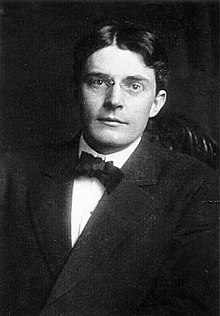John B. Watson
American psychologist (1878–1958)
John Broadus Watson (January 9, 1878 – September 25, 1958) was an American psychologist who popularized the scientific theory of behaviorism, establishing it as a psychological school. Watson advanced this change in the psychological discipline through his 1913 address at Columbia University, titled Psychology as the Behaviorist Views It. Through his behaviorist approach, Watson conducted research on animal behavior, child rearing, and advertising, as well as conducting the controversial "Little Albert" experiment and the Kerplunk experiment. He was also the editor of Psychological Review from 1910 to 1915. A Review of General Psychology survey, published in 2002, ranked Watson as the 17th most cited psychologist of the 20th century.

| This article about a psychologist is a stub. You can help out with Wikiquote by expanding it! |
Quotes about Watson
edit- ‘Watson’s Utopia, the implied authority of experts was institutionalised in the form of a technocracy managed by behavioural scientists’. Watson wanted religion, the antithesis of science, to be ‘outlawed”. When conditioning failed to cure what Watson termed the ‘hopelessly insane, or incurably diseased’, the physician ‘would not hesitate to put them to death’. According to Buckley, ‘there would also be no mercy’. This has echoes of the Nazi Goebbels. Watson’s ideal community would not recognize words like, ‘right, wrong or punishment.'
- K. W. Buckley
- In some respects, modern-day behavioural science can be construed as a derivative of the psychological school of behaviourism that gained prominence over a century ago with the work of American psychologist, John B. Watson. A rejection of the previously dominant introspectionist movement (whose focus was subjectivity and inner consciousness), Watson viewed the main goal of psychology to be the ‘prediction and control of behaviour.’ The paradigm of behaviourism concentrated exclusively on observables: the environmental stimuli that make a particular behaviour more or less likely, the overt behaviour itself, and the consequences of that behaviour (referred to as ‘reinforcement’ or ‘punishment’).
- Gary Sidley, "UK Technocrats Sharpen the Knives of Manipulation", Brownstone Institute (June 23, 2024)
External links
edit- Media related to John B. Watson on Wikimedia Commons
- Encyclopedic article on John B. Watson on Wikipedia